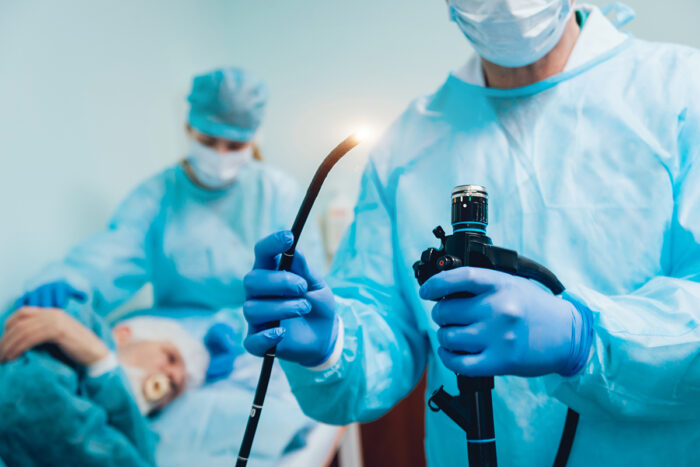Red flags indicate risk for early-onset colorectal cancer
Recognizing signs and symptoms earlier could reduce diagnostic delays, improve survival
 Getty Images
Getty ImagesResearchers at Washington University School of Medicine in St. Louis have identified four important signs and symptoms that signal an elevated risk of early-onset colorectal cancer. The incidence of colorectal cancer is rising in people under 50, making it important to recognize such signs.
Researchers at Washington University School of Medicine in St. Louis have identified four important signs and symptoms that signal an elevated risk of early-onset colorectal cancer. These red flags may be key to earlier detection and diagnosis of early-onset colorectal cancer among younger adults. The number of young adults with colorectal cancer has nearly doubled in recent years.
Studying de-identified health insurance data on more than 5,000 patients with early-onset colorectal cancer — cancer that occurs before a person turns 50 — the researchers found that in the period between three months and two years before diagnosis, abdominal pain, rectal bleeding, diarrhea and iron deficiency anemia each indicate an increased risk in those under age 50. They found that having a single one of the symptoms almost doubled the risk; having two symptoms increased risk by more than 3.5 times; and having three or more boosted the risk by more than 6.5 times.
The study is published May 4 in the Journal of the National Cancer Institute.
“Colorectal cancer is not simply a disease affecting older people; we want younger adults to be aware of and act on these potentially very telling signs and symptoms — particularly because people under 50 are considered to be at low risk, and they don’t receive routine colorectal cancer screening,” said senior investigator Yin Cao, ScD, an associate professor of surgery in the Public Health Sciences Division, and a research member of Siteman Cancer Center at Barnes-Jewish Hospital and Washington University School of Medicine.
“It’s also crucial to spread awareness among primary care doctors, gastroenterologists and emergency medicine doctors,” Cao said. “To date, many early-onset colorectal cancers are detected in emergency rooms, and there often are significant diagnostic delays with this cancer.”
Cao said two symptoms in particular — rectal bleeding and iron deficiency anemia, a condition in which there are not enough healthy red blood cells to carry oxygen — point to the need for timely endoscopy and follow-up.
In this study, Cao, with first author Cassandra D. L. Fritz, MD, an assistant professor of medicine in the Division of Gastroenterology, and co-first author Ebunoluwa Otegbeye, MD, a general surgery resident, analyzed cases of early-onset colorectal cancer and matched controls using the IBM MarketScan Commercial Database, a big-data tool that provides longitudinal, de-identified information based on health insurance claims data from about 113 million insured adults ages 18 to 64.
“It usually takes about three months to get a diagnosis from the time a person first goes to the doctor with one or more of the red-flag signs and symptoms we’ve identified,” Fritz said. “But in this analysis, we found that some young adults had symptoms for up to two years prior to their diagnoses. That may be part of the reason many of these younger patients had more advanced disease at the time of diagnosis than what we normally see in older people who get screened regularly.”
Individuals born in 1990 have double the risk of colon cancer and four times the risk of rectal cancer compared with young adults born in 1950. That trend has prompted the National Cancer Institute, American Cancer Society, American Gastroenterological Association and other professional societies to prioritize research on identifying risk factors and improving early detection. In 2021, the U.S. Preventive Services Task Force lowered the recommended age for colorectal cancer screening from 50 to 45.
Cao, also an associate professor of medicine, leads a research group focused on identifying risk factors and molecular variations in early-onset colorectal cancer. Her group is among the first to report that obesity, prolonged sitting, metabolic syndrome, diabetes, sugar-sweetened beverages and other risk factors may contribute to the rising incidence of early-onset colorectal cancer.
According to the American Cancer Society, although the death rate from colorectal cancer has been dropping for several decades in older adults due to regular colonoscopies and improved treatment, more younger people are diagnosed with the disease at advanced stages, and many are dying of the disease.
Such a shift suggests urgency in recognizing symptoms as early as possible.
“Since the majority of early-onset colorectal cancer cases have been and will continue to be diagnosed after symptom presentation, it is crucial to recognize these red-flag signs and symptoms promptly and conduct a diagnostic work-up as soon as possible,” Cao said. “By doing so, we can diagnose the disease earlier, which in turn can reduce the need for more aggressive treatment and improve patients’ quality of life and survival rates.”







